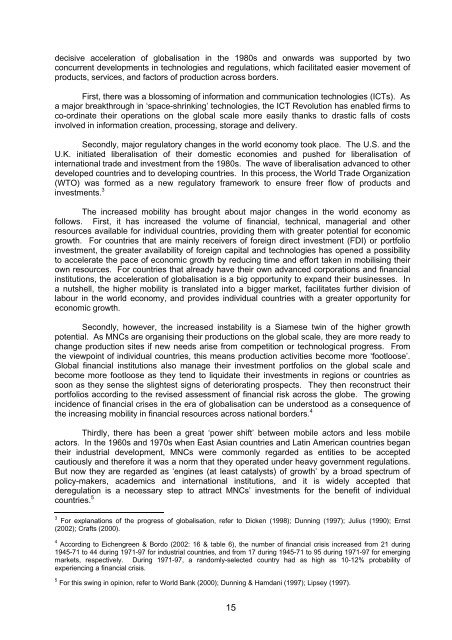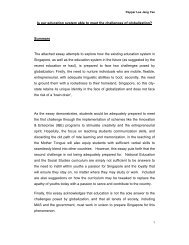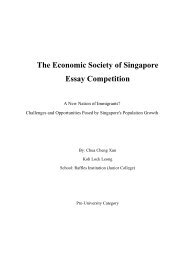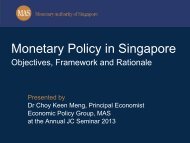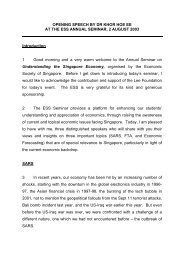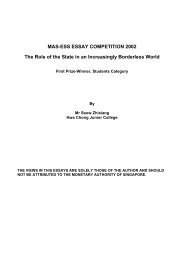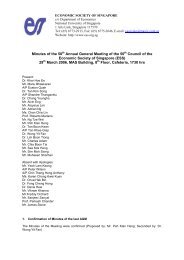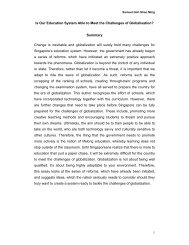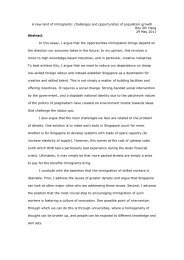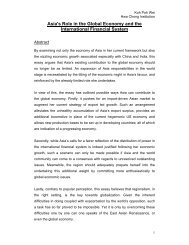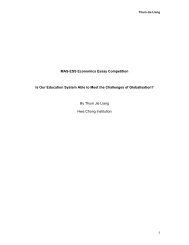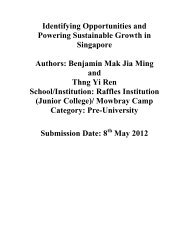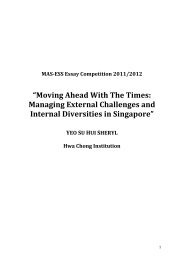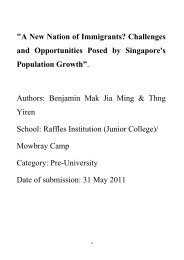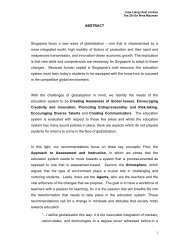the role of the state in an increasingly borderless world - Economic ...
the role of the state in an increasingly borderless world - Economic ...
the role of the state in an increasingly borderless world - Economic ...
- No tags were found...
You also want an ePaper? Increase the reach of your titles
YUMPU automatically turns print PDFs into web optimized ePapers that Google loves.
decisive acceleration <strong>of</strong> globalisation <strong>in</strong> <strong>the</strong> 1980s <strong>an</strong>d onwards was supported by two<br />
concurrent developments <strong>in</strong> technologies <strong>an</strong>d regulations, which facilitated easier movement <strong>of</strong><br />
products, services, <strong>an</strong>d factors <strong>of</strong> production across borders.<br />
First, <strong>the</strong>re was a blossom<strong>in</strong>g <strong>of</strong> <strong>in</strong>formation <strong>an</strong>d communication technologies (ICTs). As<br />
a major breakthrough <strong>in</strong> ‘space-shr<strong>in</strong>k<strong>in</strong>g’ technologies, <strong>the</strong> ICT Revolution has enabled firms to<br />
co-ord<strong>in</strong>ate <strong>the</strong>ir operations on <strong>the</strong> global scale more easily th<strong>an</strong>ks to drastic falls <strong>of</strong> costs<br />
<strong>in</strong>volved <strong>in</strong> <strong>in</strong>formation creation, process<strong>in</strong>g, storage <strong>an</strong>d delivery.<br />
Secondly, major regulatory ch<strong>an</strong>ges <strong>in</strong> <strong>the</strong> <strong>world</strong> economy took place. The U.S. <strong>an</strong>d <strong>the</strong><br />
U.K. <strong>in</strong>itiated liberalisation <strong>of</strong> <strong>the</strong>ir domestic economies <strong>an</strong>d pushed for liberalisation <strong>of</strong><br />
<strong>in</strong>ternational trade <strong>an</strong>d <strong>in</strong>vestment from <strong>the</strong> 1980s. The wave <strong>of</strong> liberalisation adv<strong>an</strong>ced to o<strong>the</strong>r<br />
developed countries <strong>an</strong>d to develop<strong>in</strong>g countries. In this process, <strong>the</strong> World Trade Org<strong>an</strong>ization<br />
(WTO) was formed as a new regulatory framework to ensure freer flow <strong>of</strong> products <strong>an</strong>d<br />
<strong>in</strong>vestments. 3<br />
The <strong>in</strong>creased mobility has brought about major ch<strong>an</strong>ges <strong>in</strong> <strong>the</strong> <strong>world</strong> economy as<br />
follows. First, it has <strong>in</strong>creased <strong>the</strong> volume <strong>of</strong> f<strong>in</strong><strong>an</strong>cial, technical, m<strong>an</strong>agerial <strong>an</strong>d o<strong>the</strong>r<br />
resources available for <strong>in</strong>dividual countries, provid<strong>in</strong>g <strong>the</strong>m with greater potential for economic<br />
growth. For countries that are ma<strong>in</strong>ly receivers <strong>of</strong> foreign direct <strong>in</strong>vestment (FDI) or portfolio<br />
<strong>in</strong>vestment, <strong>the</strong> greater availability <strong>of</strong> foreign capital <strong>an</strong>d technologies has opened a possibility<br />
to accelerate <strong>the</strong> pace <strong>of</strong> economic growth by reduc<strong>in</strong>g time <strong>an</strong>d effort taken <strong>in</strong> mobilis<strong>in</strong>g <strong>the</strong>ir<br />
own resources. For countries that already have <strong>the</strong>ir own adv<strong>an</strong>ced corporations <strong>an</strong>d f<strong>in</strong><strong>an</strong>cial<br />
<strong>in</strong>stitutions, <strong>the</strong> acceleration <strong>of</strong> globalisation is a big opportunity to exp<strong>an</strong>d <strong>the</strong>ir bus<strong>in</strong>esses. In<br />
a nutshell, <strong>the</strong> higher mobility is tr<strong>an</strong>slated <strong>in</strong>to a bigger market, facilitates fur<strong>the</strong>r division <strong>of</strong><br />
labour <strong>in</strong> <strong>the</strong> <strong>world</strong> economy, <strong>an</strong>d provides <strong>in</strong>dividual countries with a greater opportunity for<br />
economic growth.<br />
Secondly, however, <strong>the</strong> <strong>in</strong>creased <strong>in</strong>stability is a Siamese tw<strong>in</strong> <strong>of</strong> <strong>the</strong> higher growth<br />
potential. As MNCs are org<strong>an</strong>is<strong>in</strong>g <strong>the</strong>ir productions on <strong>the</strong> global scale, <strong>the</strong>y are more ready to<br />
ch<strong>an</strong>ge production sites if new needs arise from competition or technological progress. From<br />
<strong>the</strong> viewpo<strong>in</strong>t <strong>of</strong> <strong>in</strong>dividual countries, this me<strong>an</strong>s production activities become more ‘footloose’.<br />
Global f<strong>in</strong><strong>an</strong>cial <strong>in</strong>stitutions also m<strong>an</strong>age <strong>the</strong>ir <strong>in</strong>vestment portfolios on <strong>the</strong> global scale <strong>an</strong>d<br />
become more footloose as <strong>the</strong>y tend to liquidate <strong>the</strong>ir <strong>in</strong>vestments <strong>in</strong> regions or countries as<br />
soon as <strong>the</strong>y sense <strong>the</strong> slightest signs <strong>of</strong> deteriorat<strong>in</strong>g prospects. They <strong>the</strong>n reconstruct <strong>the</strong>ir<br />
portfolios accord<strong>in</strong>g to <strong>the</strong> revised assessment <strong>of</strong> f<strong>in</strong><strong>an</strong>cial risk across <strong>the</strong> globe. The grow<strong>in</strong>g<br />
<strong>in</strong>cidence <strong>of</strong> f<strong>in</strong><strong>an</strong>cial crises <strong>in</strong> <strong>the</strong> era <strong>of</strong> globalisation c<strong>an</strong> be understood as a consequence <strong>of</strong><br />
<strong>the</strong> <strong>in</strong>creas<strong>in</strong>g mobility <strong>in</strong> f<strong>in</strong><strong>an</strong>cial resources across national borders. 4<br />
Thirdly, <strong>the</strong>re has been a great ‘power shift’ between mobile actors <strong>an</strong>d less mobile<br />
actors. In <strong>the</strong> 1960s <strong>an</strong>d 1970s when East Asi<strong>an</strong> countries <strong>an</strong>d Lat<strong>in</strong> Americ<strong>an</strong> countries beg<strong>an</strong><br />
<strong>the</strong>ir <strong>in</strong>dustrial development, MNCs were commonly regarded as entities to be accepted<br />
cautiously <strong>an</strong>d <strong>the</strong>refore it was a norm that <strong>the</strong>y operated under heavy government regulations.<br />
But now <strong>the</strong>y are regarded as ‘eng<strong>in</strong>es (at least catalysts) <strong>of</strong> growth’ by a broad spectrum <strong>of</strong><br />
policy-makers, academics <strong>an</strong>d <strong>in</strong>ternational <strong>in</strong>stitutions, <strong>an</strong>d it is widely accepted that<br />
deregulation is a necessary step to attract MNCs’ <strong>in</strong>vestments for <strong>the</strong> benefit <strong>of</strong> <strong>in</strong>dividual<br />
countries. 5<br />
3 For expl<strong>an</strong>ations <strong>of</strong> <strong>the</strong> progress <strong>of</strong> globalisation, refer to Dicken (1998); Dunn<strong>in</strong>g (1997); Julius (1990); Ernst<br />
(2002); Crafts (2000).<br />
4 Accord<strong>in</strong>g to Eichengreen & Bordo (2002: 16 & table 6), <strong>the</strong> number <strong>of</strong> f<strong>in</strong><strong>an</strong>cial crisis <strong>in</strong>creased from 21 dur<strong>in</strong>g<br />
1945-71 to 44 dur<strong>in</strong>g 1971-97 for <strong>in</strong>dustrial countries, <strong>an</strong>d from 17 dur<strong>in</strong>g 1945-71 to 95 dur<strong>in</strong>g 1971-97 for emerg<strong>in</strong>g<br />
markets, respectively. Dur<strong>in</strong>g 1971-97, a r<strong>an</strong>domly-selected country had as high as 10-12% probability <strong>of</strong><br />
experienc<strong>in</strong>g a f<strong>in</strong><strong>an</strong>cial crisis.<br />
5 For this sw<strong>in</strong>g <strong>in</strong> op<strong>in</strong>ion, refer to World B<strong>an</strong>k (2000); Dunn<strong>in</strong>g & Hamd<strong>an</strong>i (1997); Lipsey (1997).<br />
15


